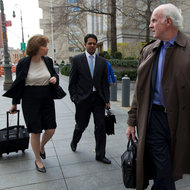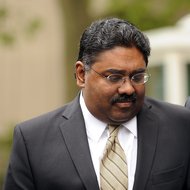SERRAVAL, FRANCE — When £113,000 in cash, seized from criminals and stored under lock and key, was taken from a police building in Warwickshire, England, British newspapers demanded to know who had had the temerity to steal from the law.
Yet even when a man was charged with theft this month in connection with the case, the police refused to identify him. Only after an outcry from Fleet Street and from free speech campaigners, who complained that justice was taking place in secret, did the Warwickshire police relent, disclosing that the suspect was a former officer, identified as Paul Andrew Greaves.
The incident is indicative of the rising tensions between journalists and the authorities in Britain in the aftermath of an inquiry into tabloid newspaper excesses and abuses. The report, by Lord Justice Sir Brian Leveson, examined the sometimes too-cosy relationship between journalists and the police, and recommended curbs on what the police should tell reporters.
It has been a longstanding practice in Britain and many other European countries for the police to withhold the names of people who have been arrested on suspicion of committing crimes. At this stage, suspects are usually described only by things like their sex, their age or their place of residence. In some European countries, like the Netherlands, the police provide the suspect’s initials; in others, like Germany, they give out a first name and a last initial.
Despite these restrictions, the British police often used to leak or confirm suspects’ identities to journalists in off-the-record conversations. This is how the names of many of the aging celebrities who have been arrested, charged or convicted of long-ago sex offenses in recent months have found their way into the newspapers.
The Leveson report recommended putting an end to these leaks — apparently prompting confusion for some police forces. The authorities in Warwickshire, for example, went further, withholding the name of Mr. Greaves even after he had been charged.
Though the local police later backtracked and the British Association of Chief Police Officers recommended that people charged with a crime should be named, journalists are in an uproar.
“Open justice is a principle that goes back to the Magna Carta,” said Bob Satchwell, executive director of the Society of Editors, referring to the document issued by King John in 1215, guaranteeing certain liberties to subjects of the English crown. “There is a danger of encroaching on rights that were won centuries ago.”
In the United States, with a tradition of openness rooted in the First Amendment, arrests are generally a matter for the public record, available to journalists or anyone else who knows where to look. Some suspects are subjected to “perp walks,” in which they are paraded in front of the news media, eliminating any doubts about their identities.
The European reluctance to name suspects is based on a stronger regard for privacy, as well as a different pace of justice. In the United States, suspects are often arrested and charged more or less simultaneously. In Europe, people can be arrested long before any charges are filed, while a police investigation proceeds; often those who have been arrested are released without any charges.
For this reason, lawyers who represent individuals in disputes with the British media say it makes sense for the police to withhold names until suspects have actually been charged.
“It’s sort of a principle of criminal justice that it’s better for 100 guilty men to walk free then for one innocent man to be wrongly imprisoned,” said Isabel Martorell, a partner at the law firm Carter Ruck who specializes in defamation and privacy cases. “As a corollary to that, it’s probably better that innocent people are not dragged through the press.”
Innocents do get dragged through the British media with what the Leveson report described as distressing frequency. In one high-profile case, a man from Clifton, England, was subjected to weeks of unseemly speculation in the newspapers after the police arrested him — and let his name slip to journalists — in 2010 on suspicion of murdering the tenant of an apartment he owned. Another tenant in the building was later convicted of the crime.
Yet advocates of greater transparency say naming names at the time of arrest can provide benefits that extend beyond just selling more newspapers via prurient headlines.
Article source: http://www.nytimes.com/2013/05/13/business/media/balancing-privacy-with-open-justice-in-britain.html?partner=rss&emc=rss

